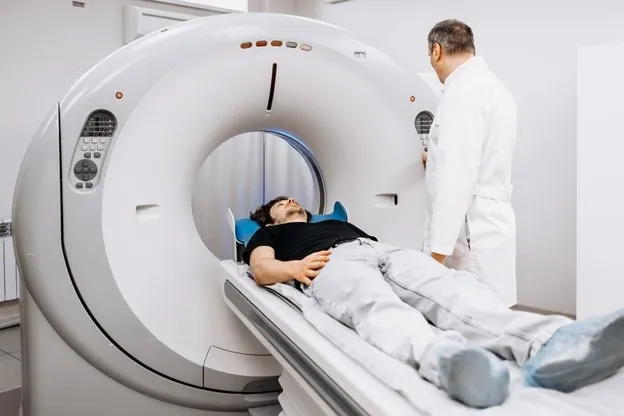RCIS VS ARRT: Differences Between Certifications Explained
October-07-2024

In the medical imaging field, there are two types of certifications you're going to learn about depending on the career path you choose.
RCIS and ARRT.
At first glance, these seem to be extremely similar certifications to fulfill the same end goal, but they're quite different and have different applications and testing procedures. Today, we're going to go over the core differences between the two certifications to help you make more educated career choices.
What is ARRT?
ARRT stands for The American Registry of Radiological Technologists. It's a certification program designed as a qualifications marker for medical professionals specializing radiological treatments and general imaging tasks.
An ARRT-certified professional can use a variety of imaging equipment including MRI, sonographs, CT scans, and X-ray technology.

What is RCIS?
RCIS stands for Registered Cardiovascular Invasive Specialist. In a way, this is similar to the role of an ARRT certification holder. It's a certification that qualifies you for imaging tasks in the medical field.
However, it differs from ARRT, because it's meant for assistants who help specifically with invasive cardiovascular surgeries and treatments. This includes pre-surgery heart and blood flow imaging, diagnostic imaging for heart conditions that might require invasive surgeries, etc.
In essence, this is a more specialized certification specifically revolving around the cardiovascular system.
What's the Core Difference Between the Two Certifications?
The two certifications are both similar and different in application, but they do overlap slightly.
The primary difference is that an ARRT specialist can technically provide imaging assistance for cardiovascular problems on top of their normal duties, but they cannot be identified as invasive treatment specialists.
This has implications for the roles that are available in your career path, what the primary goal of your position will be in the field, and ultimately what your options are.
The Exams for RCIS and ARRT Certifications
As both certifications are similar, so are the exams that are taken to pursue them.
Here's a breakdown of what to expect from each one.
Keep in mind that the scoring systems we highlight are not like many other tests. You don't have to get a certain number of questions right with a little bit of leeway. Each question is worth a varying amount of points, and that changes for each test regularly.
RCIS Exam:
The RCIS exam is lengthy.
It's a 3-hour long test that consists of 150 questions, and it contains 20 questions that aren't scored and are designed to provide feedback for the test designers rather than question your ability in the field.
All of this is done online, and you're required to score at least 650 points out of 900. What makes it slightly trickier is that the 20 unscored questions aren't just run-of-the-mill survey-type questions. They're woven into the exam itself and presented as normal questions.
So, you don't know if the question you're answering is scored or unscored.

10 minutes of your 3-hour period is reserved for a simple initial tutorial that familiarizes you with the test layout and a post-exam survey that doesn't affect your score.
As such, you don't have a full 3 hours, and you have to take that into account while managing your time for the test.
After your test, you'll get an unofficial score. This doesn't automatically determine success or failure. The test still needs to be officially judged, but it does give you a good idea of what to expect.
A great way to ensure you manage your time properly and have a good chance of meeting the minimum scoring requirement is to take RCIS practice tests.
These are tests designed to emulate the actual exam. The questions aren't exactly the same, and they certainly aren't in the same order, but they do go over the same general topics and have the same layout.
It's recommended to take as many as possible to give yourself the best chance at success.
ARRT Exam:
The ARRT exam is similar to the RCIS exam, but with some key differences.
First and foremost, the scoring scale is different. Rather than requiring a score of 650 out of 900, the ARRT exam requires you to score 75 out of 99. There are also far more questions to answer.
On average, there are 200 questions on the exam. Luckily, you also get 4 hours to complete the ARRT instead of the 2 hours and 50 minutes used for the RCIS exam.
Other than that, the content of the ARRT exam has a focus on entry-level imaging qualifications, and more exams are available to acquire more advanced qualifications with a richer career path.
The entire exam is taken online, and like the RCIS exam, you can take ARRT cardiac-interventional practice tests to help you prepare.
Like the RCIS practice tests, these are designed to emulate the actual ARRT exam without giving you the actual test, and they're crucial for a successful exam experience.
Which Certification is Better?
Now that you know a little more about each certification, you might be wondering which one is better for you and your future career. After all, each educational decision you make right now will have a major impact on your career and the options available to you in the future.
However, there's no easy answer. Neither option is technically better than the other, and neither option fits every soon-to-be imaging professional. Instead, it depends on the career path you're choosing.
In general, ARRT certification has a broader use in the field due to its focus on a wider range of equipment usage, applications, etc. There are even subsequent exams that can qualify you for more advanced roles.
However, the specialized nature of RCIS certification makes you a better option specifically for high-stakes invasive cardiovascular care roles.
It's important to take your time and choose your career path first, and then you can choose the certification that aligns with it most accurately.
Exam Edge is Here to Help
When deciding between RCIS and ARRT, it's important to understand the unique focus of each certification and how they align with your career aspirations.
Regardless of which certification is best for your upcoming career, Exam Edge, the #1 online test prep resource, is here to provide you with the resources and practice materials you need to succeed.
Related Practice Tests
Blogs related to: RCIS VS ARRT: Differences Between Certifications Explained












 ARRT Cardiac-Interventional Radiography
ARRT Cardiac-Interventional Radiography CCI RCIS
CCI RCIS